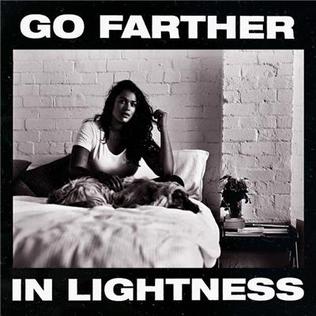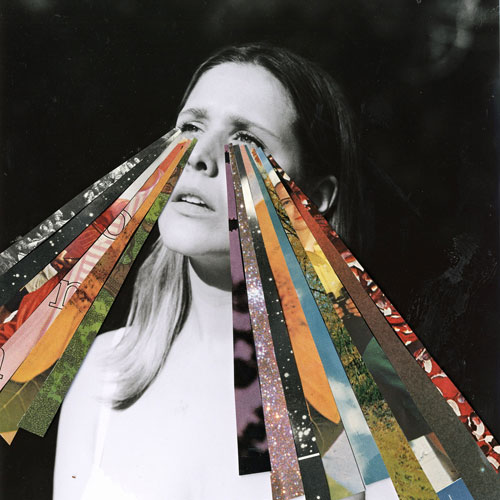I recently tackled and broke down the admittedly clickbaity subject of what does is rock dead mean? The TLDR of it is that while it’s not making a dent in the charts like it once did, the rock genre is alive and well with arguably more artists putting out great music than ever before.
One such example is Sydney, Australia by way of London, England rock five piece Gang of Youths with their sophomore effort “Go Farther in Lightness”.
Singer and songwriter David Le’aupepe has been through more adversity, loss, and struggles in his 25 years on Earth at the time of the record’s release than some people have in their entire lives. In the face of the kind of adversity which would cause some people to pack it in altogether, he’s used it to create an immensely powerful and uplifting album.
I was vaguely aware of Gang of Youths after their debut, 2015’s “The Positions”. This was specifically due to its main single “Magnolia” which, for my money, is the most fun song about a suicidal bender you’ll ever hear. Despite its backdrop of being about one of the darkest periods in Le’aupepe’s life, there’s an uplifting and invincible feel to it, reminiscent of a more bouncing and desperate “All the Wine” from the The National. I used this song as my morning alarm for quite awhile after I first heard it, and it’s easily the standout from its record which otherwise didn’t do nearly as much for me.
As is the case for a lot of (good) bands, Le’aupepe and Gang of Youths heavily refined their songwriting between their debut and their sophomore records, with a strong EP “Let Me Be Clear” which they released in between in 2016 showing shades of this.
The songs of Go Farther in Lightness feature a focus not found amongst what felt like a lot of meandering on most of The Positions, and that maturation makes a huge difference in making these songs abundantly more memorable. Let’s talk about why in this Go Farther in Lightness review.
Go Farther in Lightness Review
Go Farther in Lightness opens with the Springsteen-esque “Fear and Trembling”. It’s one of the better openers I’ve heard in quite a few years and effectively sets up the ambitious scale of the record, covering a lot of ground in its six minute length much like the staggering 75 minutes which the album occupies.
It begins as a piano ballad which you could picture everyone singing along with at the pub at the top of their lungs, much like fans now do at their gigs. It describes walking through the streets pissed with a friend and taking an existential kind of appraisal of your life and feeling nostalgic for that moment itself as we only can when we’re pissed on something.
Its quiet and genuine tone lulls you in for a minute and 26 seconds before exploding into a carnival, complete with bells, organs, and soaring guitars, all of which feels very vintage Bruce.
Le’aupepe covers a lot of ground in his lyrics.
One of the many ongoing themes in his writing relates to his struggle with being raised religiously but wanting to find his own way to and version of God. Because of his upbringing, religion has been deeply ingrained in him, but at times it goes directly at odds with his demons and struggles to become a better person.
Incidentally with his background at spending a lot of his youth in an evangelical church, he performs with the limitless energy of a preacher and the skills of a master orator. He’s arguably the most electric frontman in rock today and it’s nearly impossible to take your eyes off of him while he’s performing.
The energy level doesn’t abate as it goes into the rocking fight song “What Can I Do if the Fire Goes Out?”
Tackling the same theme of losing that ingrained faith in God, Le’aupepe wonders aloud what to do if he loses that faith, that fire, which he had been raised to take as a fact of life.
Next is the rocker “Atlas Drowned” – essentially a hugely satisfying middle finger to Ayn Rand’s objectivist and selfish theories presented in her 1957’s “Atlas Shrugged”.
There’s a nice dynamic range between the confident verses before pulling it back into its building chorus.
This was an early favorite of mine, and features some of Le’aupepe’s best vocals, particularly that final note which he holds out then drives up even farther into a very satisfying scream, surprising you with that powerful added range to his voice.
It’s one of those moments which perked my ears up the first time I was listening to this record.
The record doesn’t take a breath until nicely segueing into “Keep Me in the Open”.
That familiar mechanic of tailing songs into other songs helps to create that sense of continuity that this is a record designed to be ingested as a whole, bordering on concept album territory, and less a random collection of songs written vaguely around the same time.
I have to admit that I’m inspired by Le’aupepe’s journey in his still young life; it’s difficult not to be if you’re familiar with it.
His first marriage fell apart after his wife was diagnosed with terminal cancer, and this song does a beautiful job taking a step back from all of this to take stock and reflect on how things unraveled.
It’s a really lovely song, with some beautiful piano dancing throughout played by keyboardist Jung Kim, and a completely different example of the great things Le’aupepe does vocally on the lower end of his range. As an aside, I really like how they re-engineer this one live to revolve around some lightly played guitar chords to keep tempo and rhythm.
There are a three interludes which bring the track number up to 16. “L’imainaire” is the first one which basically exists to set up the subsequent “Do Not Let Your Spirit Wane”.
This track which makes me wish I could remember and describe my dreams as well as Le’aupepe as he vividly describes a recurring dream he has.
In it, he has everything a person could want in his home life in a beautiful wife and child. Yet like some horrible joke, even in his dream he almost takes this all for granted while feeling as if he doesn’t deserve them, keeping to himself lost in his depression.
It’s certainly an accomplishment of the lyric that I was feeling for the subsequent loss of Le’aupepe’s imaginary family in what amounts to more of a complex and cruel nightmare than a dream.
I’d be remiss if I didn’t mention that this track obviously is informed musically by Guns n’ Roses’ “Sweet Child O’ Mine”, taking the same chord progression and even pulling its famous lead guitar riff for the interlude track L’imainaire. A couple guitar riffs near the end of Do Not Let Your Spirit Wane are straight out of Guns n’ Roses, as well.
I definitely wasn’t expecting that influence, but it’s an interesting decision and makes for a beautiful, trippy fever dream when slowed down on the longest track of the album.
It’s worth mentioning that longtime lead guitarist Joji Malani recently left the group after this record was released. It’s hard to believe that his presence and influence won’t be missed moving forward as he seems to be a supremely talented musician.
One of my favorite songs off of the record is also the shortest with a lyric, the title track “Go Farther in Lightness”. It’s a raw, stripped down piano ballad about feeling detached from his hometown of Sydney which actually serves as a nice love letter to it even in its brevity. It’s played over some background audio of what sounds like a video from a day at the beach with seagulls chirping, possibly in Sydney.
Technically it’s another interlude to set up the next song, “Achilles Come Down”.
This is a fan favorite and a complete change of pace as nearly the entire instrumental behind Le’aupepe’s vocals is made up of strings. Lyrically it imagines the protagonist on the roof he climbed up to in “Go Farther…” and battling his own inner monologue telling him to jump and end it all. Achilles Come Down is the sign of a band who has never been and will never be afraid to take risks.
Go Farther in Lightness always gives you both sides of the coin; the dark and light. Therefore it’s by design that it goes straight into the reflective and reassuring “Persevere”.
Persevere is an incredibly inspiring song and another stand out to me which puts things into perspective for Le’aupepe, referencing a close friend in the aftermath of the worst thing imaginable (the loss of their baby).
In the face of his own struggles, seeing his friend’s capacity to summon the hard fought strength to carry on, Le’aupepe sees what true resolve is.
With all of that context, I admit I still get choked up when he delivers the final section of the song over some gospel vocals in the background:
We threw a party up in here, but God, it was bittersweet
I live hard ’cause I am scared that I won’t mean anything
So now I’m praying to the ceiling, to the windows, to the walls
Against this sudden sinking feeling that there’s nothing there at all
And still
We just persevere
It’s easy to remain insular, caught up entirely in our own problems and magnifying them because they are our own. But it’s those moments when we see that there is always someone who has it worse which helps us to contextualize everything.
This isn’t anything new, particularly with how I phrased it, but I love how this song presents it. After everything we’ve been through in this record in identifying with the protagonist to this point, it’s all the more impactful at this moment.
“Let Me Down Easy” is another fan favorite and a well deserved moment on the record musically of simply having fun. This is certainly the case in seeing them live as Le’aupepe kicks off the dancing, oftentimes jumping in the crowd to blow off some steam and create a nice communal moment with the audience.
Outside of some nice Eastern influenced riffs and other ear candy breaking through now and then, the tempo and progression are pretty static in their admitted danceability on this one; it’s one of those songs which just serves as a nice bedrock to deliver some great lyrics over.
Like Keep Me in the Open, it’s a song about taking a step back and reflecting on the path which led to the breakdown of a marriage.
In spite of all of that, it’s a breezy feel good number which takes to dealing with its problems in the same way, with my favorite line coming at the end of this:
Honey, it’s no secret that I’ve been losing my way
In the weirdest of moments and the stupidest of ways
But hey, I’m still young and it’s gonna be okay
I got solipsism, baby, and I brought lemonade
When I look at it, the tone of the album continues to arc more bullishly as it goes on to the final section.
“The Heart is a Muscle” is the most positive, feel good moment on the record which, at its core, is all about positivity, albeit in the face of the worst things that life can throw at you and crippling moments of doubt.
It’s also probably the closest the message gets to borderline cheesy, with the main lyric being:
The heart is a muscle… I want to make it strong!
But when the lyric is delivered as infectiously as its hook is, it’s hard to find fault with it. It’s a very poppy and fun uptempo number which makes for a great single. The bridge in particular has a really nice musical and instrumental change on the lyric:
So tuck my hair behind my ears and touch my soul again
Its piano bit and vocal melody there feels reminiscent of something from vintage Elton John which, judging by Gang of Youths’ appreciation for classic rock, is likely no coincidence.
The final stretch of the record holds my two favorite songs from it and two of my favorite songs in general.
The first being “The Deepest Sighs, the Frankest Shadows” which is one of the best written songs I’ve heard in quite some time with one of the best examples of managing the dynamic cresting and wanings of a song.
It begins quietly with a nice building bassline played by bassist Max Dunn, teasing that this song is going to be a mountain. Le’aupepe then breaks through, sounding as vulnerable and reflective as any point on the record:
There’s a sky full of lights and none of them stars
But each white, silvery flicker’s a faithful reminder to us
Of a weight that’s in youth that makes a dick of us all
If it happened today, then it’s probably happened before
You can picture the scene which led to the existential realization which subsequently led to the song itself.
Purportedly Le’aupepe was going through a long bout of writer’s block at the time. He was walking over the Brooklyn Bridge one night and took in the sea of lights across the skyline, each one representing a unique life.
It was overwhelming at first in that sense that it’s a reminder that we’re just one of billions, and that’s only in the context of our own planet.
But in that moment of understandably feeling that we’re devoid of any meaning, Le’aupepe was hit with just the opposite. In an absence of meaning, we have the ability to create our own meaning, attributing it to ourselves, our thoughts, or anything else we want.
It’s the idea that because we’re nothing, we’re everything… if we wish it. There’s a lot of power in that simple idea, and it’s the feeling that Le’aupepe chases in this song.
Structurally the song makes no secrets that it’s constantly building, gradually adding elements throughout the verse and segueing with a huge drum fill from drummer Donnie Borzestowski to satisfyingly crash into the chorus we’ve been waiting for:
‘Cause not everything means something, honey
So say the unsayable, say the most human of things
And if everything is temporary
I will bear the unbearable, terrible triteness of being
Alone in my house, frozen in time
But don’t get me wrong now, honey, I am trying
There’s a lot of bombastic fanfare from chimes, glockenspiel, and a huge horn riff after that chorus, ratcheting up the energy even farther on the bridge as Le’aupepe cries out:
Ah, pass me a light
Ah, honey, pass me a light
Won’t you feel me tonight?
Goddamn do you feel me tonight?
This moment is pure electricity and it’s nearly impossible to not be on the same wavelength at this point in the song.
Finally having reached the bottom of the mountain, the song ends on one final restrained chorus as the listener and band gather themselves. Most of the instruments fade out as the chords quietly change beneath Le’aupepe delivering that chorus one final time, sounding more resolved than ever.
There’s one piece linking this and the final song, the penultimate “Our Time is Short”. The strength of the two songs it’s sandwiched between and the rest of the album almost make this feel like an afterthought, though that’s selling it short.
As the title suggests and as Le’aupepe beautifully sings as a sweeping lullaby, Our Time is Short is a reminder that we’re here for a limited time, so do with that as you will but carry that with you in your mind and let it inform your choices in life.
It also acts as a nice set up for the final song and arguably my favorite on this excellent record, the epic closer “Say Yes to Life”.
The motivational phrase for whatever cause it conjures in your mind aside, Le’aupepe weaves in his personal experiences and observations to make the greatest affirmation of life I’ve likely ever heard on a record in this song.
After 30 some seconds of atmospheric teasing, the song begins in proper with a driving beat like a powder keg waiting to go off.
One of my favorite lines turns up early on in the first verse:
I could almost take a whole life
To disclose how I feel about the now
Can’t give you an insightful conclusion
As a lyricist myself, there were years when I could emotionally relate to that line, so it’s a relief to see that thought capsulized so wonderfully succinctly.
The tension of the verses is restrained from boiling over by a couple of breaks with reassuring messages before the real cathartic payoff of not just the song but the entire record comes 2 minutes and 34 seconds in (in the full version) as he cries out:
Hey, it’s me, I’m bringing you a case of Dry
And words un-engendered fuck this, dumb city sleeps in the night
And I won’t leave you hanging in the wind
So let me love with a vengeance
My sad, sweet and unfinished friend
And we can go and mock the skyline now
Those bourgie windows full of dickheads
We don’t know a thing about
You wanna feel absolved tonight
I’ve heard what you’re saying, it’s okay not to be so alright
Le’aupepe is not speaking of himself for once but is clearly there for the listener. Knowing this is someone who has lived everything he’s written about, and after the previous 70 minutes of building up this pathos, these lines are well earned.
It finishes on the album’s strongest note; a vocal and instrumental crescendoed release:
But don’t be alone
Did I tell you that I spent most of my sister’s wedding stoned?
Say what you want with blood and bone
And stick a finger in their faces when they say you’re overblown
Say yes to sun! Say yes to pain!
Say yes to sticking with a city through a thousand days of rain!
Say yes to grace! Say no to spite!
Say yes to this! Say yes to you!
Say yes to me! Say yes to love!
Say yes to life!
Say, say yes to life!
Le’aupepe is admitting that he’s just as flawed as the person whom he’s addressing with that perfectly timed one line anecdotal admission of his sister’s wedding. He’s not anyone to be put on a pedestal, and he’s just as vulnerable as the audience.
Weakness, darkness, and adversity are all inevitable; they’re all major parts of life. And while that can’t be helped, you can choose to not go through that adversity alone.
A cynic can easily dismiss those final few lines. But for anyone who has ever felt a moment of true vulnerability, experienced bouts of crippling depression and felt like there was no way out, these lines can feel like a life raft.
This is especially true in the full context of this record.
With that in mind, it’s hard to do much better through the medium of song and album. And it’s hard to give much higher praise than that.
Gang of Youths – Go Farther in Lightness Review Score: 5/5
You can listen to Go Farther in Lightness or purchase it through https://www.gangofyouths.com/


